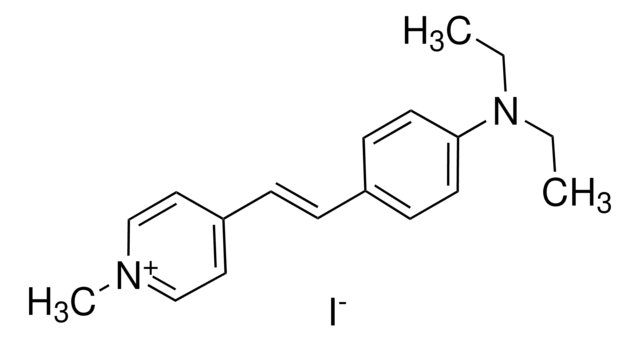83702
Rhodamine 123
BioReagent, for fluorescence, ≥85% (HPLC)
Synonym(s):
2-(6-Amino-3-imino-3H-xanthen-9-yl)benzoic acid methyl ester
About This Item
Recommended Products
grade
for fluorescence
Quality Level
product line
BioReagent
Assay
≥85% (HPLC)
form
powder
impurities
≤10% water
solubility
ethanol: 20 mg/mL, clear, red
suitability
in accordance for fluorescence
SMILES string
Cl[H].COC(=O)c1ccccc1C2=C3C=CC(=N)C=C3Oc4cc(N)ccc24
InChI
1S/C21H16N2O3.ClH/c1-25-21(24)15-5-3-2-4-14(15)20-16-8-6-12(22)10-18(16)26-19-11-13(23)7-9-17(19)20;/h2-11,22H,23H2,1H3;1H
InChI key
MYFATKRONKHHQL-UHFFFAOYSA-N
Looking for similar products? Visit Product Comparison Guide
General description
Application
- as a substrate for P-glycoprotein (P-gp) to read out functional transporter activity in fluorescent accumulation assays
- to label the cells for estimating the P-gp expression by flow cytometry
- in transport studies, was added to the apical to basolateral (AB-transport) or basolateral to apical (BA-transport)
- the detection of mitochondrial membrane potential (ΔΨm)
Biochem/physiol Actions
Other Notes
Storage Class Code
11 - Combustible Solids
WGK
WGK 3
Flash Point(F)
Not applicable
Flash Point(C)
Not applicable
Personal Protective Equipment
Certificates of Analysis (COA)
Search for Certificates of Analysis (COA) by entering the products Lot/Batch Number. Lot and Batch Numbers can be found on a product’s label following the words ‘Lot’ or ‘Batch’.
Already Own This Product?
Find documentation for the products that you have recently purchased in the Document Library.
Customers Also Viewed
Articles
Nitric oxide (NO) as a signal transporter in neurons, endothelial cells and in the immune system.
Our team of scientists has experience in all areas of research including Life Science, Material Science, Chemical Synthesis, Chromatography, Analytical and many others.
Contact Technical Service











